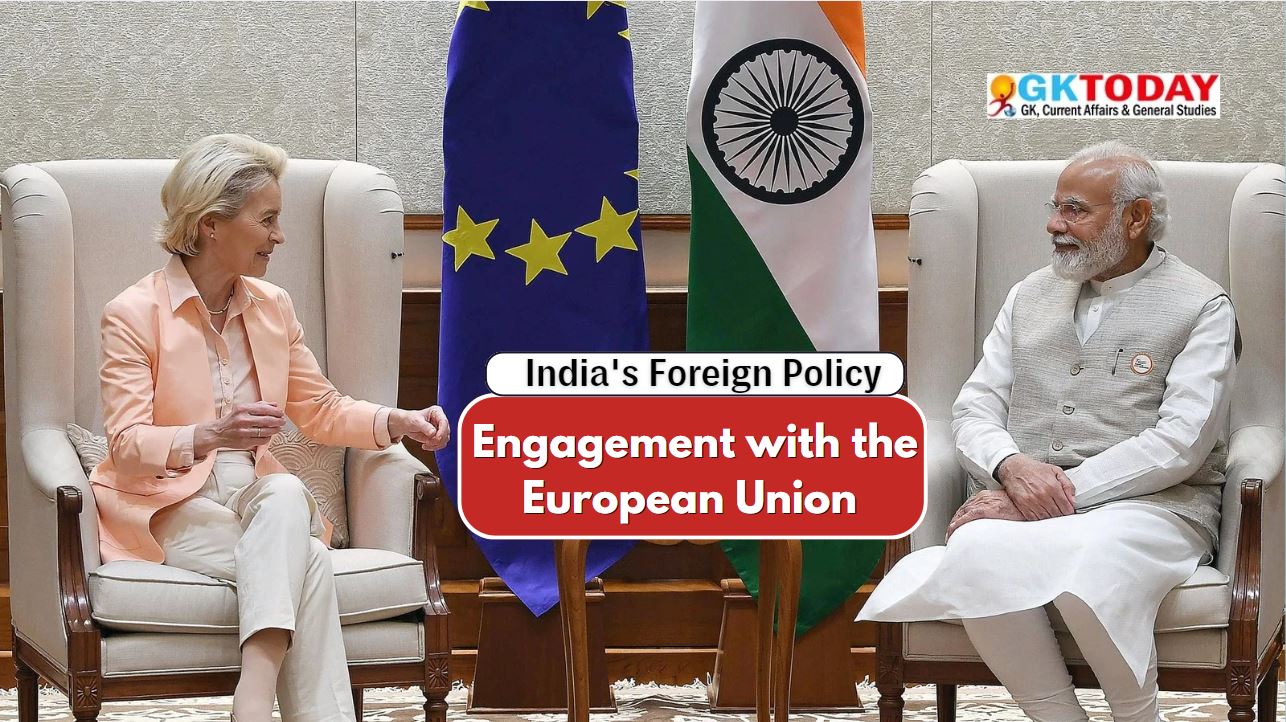India’s Foreign Policy – Engagement with the European Union [UGC NTA NET Political Science]
India and the EU established diplomatic relations in 1962, marking the beginning of formal interactions. This relationship has since grown through various frameworks and agreements.
Establishment of Diplomatic Relations
– 1962 – Formal diplomatic relations began. – 1994 – The EU-India Cooperation Agreement was signed, focusing on political dialogue, trade, and development.
Political Relations
Political relations between India and the EU have strengthened through regular summits and strategic partnerships.
Bilateral Summits
– 2000 Onwards – Regular summits initiated. – 2000 – First EU-India Summit held in Lisbon.
Strategic Partnership
– 2004 – Strategic Partnership established. – Focus on political dialogue, economic cooperation, and cultural exchanges.
Joint Action Plan
– 2005 – A Joint Action Plan was adopted. – It aimed to enhance cooperation across various sectors, including security and trade.
Economic Relations
The EU is one of India’s largest trading partners, which has implications for both economies.
Trade Volume
– 2020 – Trade in goods and services exceeded €100 billion. – The EU accounts for a substantial portion of India’s export and import activities.
Investment
– The EU is a major source of Foreign Direct Investment (FDI) in India. – Investments are notably concentrated in telecommunications, energy, and infrastructure sectors.
Free Trade Agreement (FTA)
– Negotiations for an FTA began in 2007. – Discussions faced challenges but resumed in 2021, reflecting ongoing commitment to deepen economic ties.
Security Cooperation
Security cooperation is a vital aspect of India-EU relations, addressing contemporary global threats.
Counter-Terrorism
– Joint initiatives focus on combating terrorism. – Includes information sharing and capacity-building measures.
Cybersecurity
– Collaborative efforts to strengthen cybersecurity frameworks. – Focus on protecting critical infrastructure from cyber threats.
Maritime Security
– Cooperation in ensuring maritime security in the Indian Ocean Region. – Joint exercises and information sharing enhance regional stability.
Climate Change and Sustainable Development
Both India and the EU are committed to addressing climate challenges and promoting sustainable development.
Partnership on Climate Change
– Joint initiatives under the EU-India Clean Energy and Climate Partnership. – Focus on renewable energy and reducing carbon emissions.
Sustainable Development Goals (SDGs)
– Cooperation in achieving SDGs, particularly in poverty alleviation, education, and health. – Collaborative projects aim to improve living standards in India.
Cultural and Educational Exchanges
Cultural and educational exchanges enhance mutual understanding and cooperation.
Erasmus+ Programme
– Promotes student and academic exchanges between India and EU member states. – Enhances educational collaboration and cultural understanding.
Cultural Dialogues
– Initiatives to promote cultural exchanges through festivals and art exhibitions. – Academic collaborations encourage deeper ties between societies.
Challenges in Relations
Despite the strong ties, challenges exist that affect the relationship between India and the EU.
Trade Barriers
– Issues related to tariffs and non-tariff barriers hinder trade. – Regulatory standards create obstacles for smoother trade relations.
Human Rights Concerns
– The EU has raised concerns regarding human rights issues in India. – Criticism can strain diplomatic relations and affect cooperation.
Geopolitical Tensions
– Diverging views on global issues, such as the Russia-Ukraine conflict. – Differences in perspectives regarding China’s influence in the region.
Recent Developments
Recent years have seen developments in the India-EU relationship.
EU-India Trade and Technology Council
– Established in 2022 to enhance cooperation in technology, trade, and security. – Aims to address emerging challenges in the digital economy.
Global Gateway Initiative
– EU’s strategy to enhance connectivity with India. – Focuses on infrastructure development and investment opportunities.
Indo-Pacific Strategy
– EU’s increasing interest in the Indo-Pacific region aligns with India’s strategic interests. – Cooperation in this region is vital for both parties.
Future Prospects
The future of India-EU relations appears promising, with several avenues for enhanced cooperation.
Strengthening Ties
– Potential for deeper cooperation in technology and green energy. – Digital economy initiatives could further strengthen economic links.
Geopolitical Alignment
– Increased alignment on global issues such as climate change and security. – Collaborative approaches can address shared challenges.
Bilateral Agreements
– Possibility of finalising the FTA and other sectoral agreements. – Enhanced economic ties will benefit both economies.


